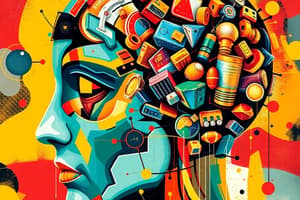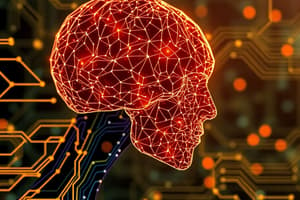Podcast
Questions and Answers
What key advancement has significantly contributed to the evolution of AI in the 21st century?
What key advancement has significantly contributed to the evolution of AI in the 21st century?
- Improved rule-based systems
- Growth of machine learning and deep learning (correct)
- Increase in plain data storage
- Development of vocal recognition hardware
Who is regarded as the father of AI for his pioneering work in the field?
Who is regarded as the father of AI for his pioneering work in the field?
- Marvin Minsky
- John McCarthy
- Alan Turing (correct)
- Herbert Simon
In what year did John McCarthy coin the term 'artificial intelligence'?
In what year did John McCarthy coin the term 'artificial intelligence'?
- 1956 (correct)
- 1950
- 1960
- 1972
Which application is NOT a common use of AI in everyday technology?
Which application is NOT a common use of AI in everyday technology?
What method of AI allows computers to improve performance by learning from data?
What method of AI allows computers to improve performance by learning from data?
Which of the following is a significant benefit of AI in healthcare?
Which of the following is a significant benefit of AI in healthcare?
What technology underpins deep learning algorithms?
What technology underpins deep learning algorithms?
Which of the following is NOT a typical task that AI can perform?
Which of the following is NOT a typical task that AI can perform?
What is a major concern associated with the rise of AI in the workforce?
What is a major concern associated with the rise of AI in the workforce?
Which technology is expected to drive the next wave of innovation alongside AI?
Which technology is expected to drive the next wave of innovation alongside AI?
What is a critical issue that arises from AI systems learning from historical data?
What is a critical issue that arises from AI systems learning from historical data?
How can AI positively impact healthcare accessibility?
How can AI positively impact healthcare accessibility?
Which ethical framework principle is emphasized in responsible AI development?
Which ethical framework principle is emphasized in responsible AI development?
What role does education play in preparing society for AI?
What role does education play in preparing society for AI?
What is a potential risk of adversarial attacks on AI systems?
What is a potential risk of adversarial attacks on AI systems?
Which of the following is NOT a way AI can address global challenges?
Which of the following is NOT a way AI can address global challenges?
What is an important aspect of ensuring fairness in AI systems?
What is an important aspect of ensuring fairness in AI systems?
What can organizations do to support workforce transition in an AI-driven economy?
What can organizations do to support workforce transition in an AI-driven economy?
Flashcards
What is Artificial Intelligence (AI)?
What is Artificial Intelligence (AI)?
The ability of computer systems to perform tasks usually requiring human intelligence, like understanding language or recognizing images.
When did the idea of AI emerge?
When did the idea of AI emerge?
The concept of machines imitating human intellect was first proposed in the mid-20th century. Pioneers like Alan Turing and John McCarthy laid the foundation of this field.
What is Machine Learning (ML)?
What is Machine Learning (ML)?
The process of allowing computers to learn from data and improve their performance without explicit programming. This enables them to adapt to new situations.
What is Deep Learning?
What is Deep Learning?
Signup and view all the flashcards
What is Natural Language Processing (NLP)?
What is Natural Language Processing (NLP)?
Signup and view all the flashcards
How is AI used in various industries?
How is AI used in various industries?
Signup and view all the flashcards
How does AI improve user experience?
How does AI improve user experience?
Signup and view all the flashcards
How does AI enhance online safety?
How does AI enhance online safety?
Signup and view all the flashcards
Job Displacement by AI
Job Displacement by AI
Signup and view all the flashcards
Bias in AI
Bias in AI
Signup and view all the flashcards
Privacy Concerns with AI
Privacy Concerns with AI
Signup and view all the flashcards
Adversarial Attacks on AI
Adversarial Attacks on AI
Signup and view all the flashcards
Ethical Challenges of AI Weapons
Ethical Challenges of AI Weapons
Signup and view all the flashcards
Ethical AI Frameworks
Ethical AI Frameworks
Signup and view all the flashcards
Generative AI
Generative AI
Signup and view all the flashcards
Quantum Computing
Quantum Computing
Signup and view all the flashcards
Neuromorphic Computing
Neuromorphic Computing
Signup and view all the flashcards
AI for Global Challenges
AI for Global Challenges
Signup and view all the flashcards
Study Notes
Artificial Intelligence: A Transformative Technology
- AI encompasses computer systems performing tasks requiring human intelligence, like understanding visuals, speech, making decisions, and translating languages.
- Recent advancements in computing, data, and machine learning algorithms have boosted AI's development.
- AI's roots trace back to the mid-20th century, with pioneers like Alan Turing and John McCarthy.
- Turing proposed a machine simulating human intelligence.
- McCarthy coined the term "artificial intelligence" in 1956, marking a formal beginning.
- Early AI relied on rule-based systems and symbolic reasoning, struggling with real-world complexity.
Machine Learning and Deep Learning
- 21st-century AI evolved with machine learning (ML).
- ML enables computers to learn from data, improving performance without explicit programming.
- Deep learning, a subset of ML, employs neural networks to process vast data and identify patterns.
- This has yielded breakthroughs in image recognition, natural language processing, and automated systems.
Applications of AI in Everyday Life
- Virtual assistants (Siri, Alexa, Google Assistant) use natural language processing to respond to commands.
- Recommendation systems (Netflix, YouTube, Amazon) suggest content based on user preferences.
- Social media platforms use AI for personalized feeds, harmful content detection, and misinformation combating.
AI's Impact on Industries
- Healthcare: AI assists in disease diagnosis, patient outcome prediction, and personalized treatments (e.g., early cancer detection).
- Finance: AI used in fraud detection, algorithmic trading, and customer service (chatbots).
- Transportation: Autonomous vehicles promise to reduce accidents and improve efficiency.
Ethical, Social, and Economic Challenges
- Job displacement: AI automation of tasks may lead to unemployment in some sectors, requiring retraining programs.
- Bias in AI systems: AI algorithms inherit and perpetuate societal biases leading to unfair treatment in areas like hiring and lending; addressing this requires transparent algorithms, diverse datasets, and ethical guidelines.
- Privacy concerns: AI's reliance on data raises issues about personal information collection, storage, and use, particularly in surveillance applications.
- Security and safety: Adversarial attacks could produce incorrect outputs in AI systems, with serious consequences (e.g., autonomous vehicle accidents); this requires ethical frameworks and security measures
Future of AI
- Emerging technologies: Generative AI (e.g., GPT-3), quantum computing, and neuromorphic computing will drive further innovation.
- Global challenges: AI holds the potential to address challenges like climate change, healthcare accessibility, and poverty.
- Collaboration and Education: Effective AI implementation requires collaborations across sectors; education, research, and regulatory frameworks are essential.
- AI Literacy: Incorporating AI literacy into education can help individuals adapt to an evolving AI-driven world; specialised training is also needed.
Conclusion
- AI is significantly reshaping the world, presenting opportunities and challenges.
- Its impact across sectors is already apparent, and potential solutions to global issues are considerable.
- Addressing ethical, social, and economic implications is critical for ensuring equitable benefits for all.
Studying That Suits You
Use AI to generate personalized quizzes and flashcards to suit your learning preferences.
Description
Explore the transformative technology of Artificial Intelligence, its historical roots, and its evolution into modern machine learning and deep learning. This quiz covers significant milestones, key figures, and foundational concepts that shape AI today.




